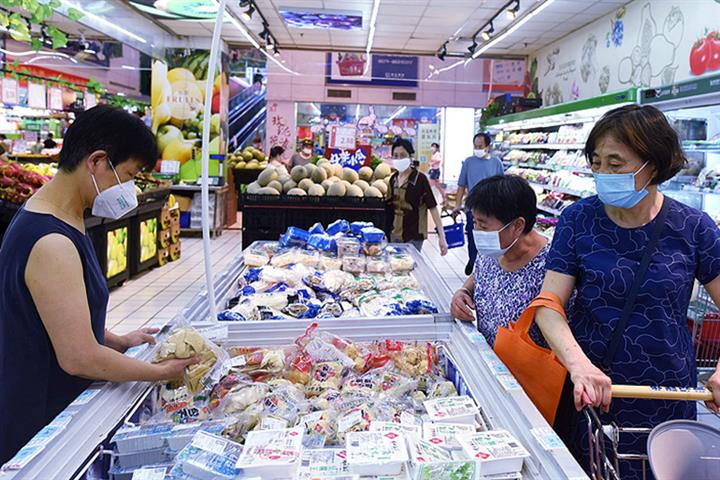 China’s Consumer Inflation May Edge Past 3% in Second Half, Chief Economists Say
China’s Consumer Inflation May Edge Past 3% in Second Half, Chief Economists Say(Yicai Global) July 11 -- China’s consumer price index, a gauge of inflation, could exceed 3 percent during the second half as consumer prices gained by more than expected in June due to the surging prices of pork, gasoline and services coupled with last year’s low baseline, chief economists told Yicai Global.
The CPI is likely to continue to edge up slightly in the next six months, and might surpass 3 percent some months, as China continues to face the dual pressures of structural and imported inflation, said Wen Bin, chief economist at China Minsheng Bank. But the average CPI for the year will remain within the target set by the government of 3 percent, he added.
Consumer inflation in June expanded 2.5 percent in June, the fastest clip since August 2020, and more than the 2.36 percent predicted by a Yicai Global poll of chief economists.
There will be certain imported inflation pressure in the second half, and the CPI growth rate could be close to 3 percent in the third quarter, or even higher in some months, but it is under control, Li Zhan, chief economist at China Merchants Fund research department, told Yicai Global.
The CPI will climb year on year in the second half, but monthly growth is likely to remain flat, said Wang Jun, a member of the China Chief Economist Forum. Although live hog prices may push up overall inflation this year, there is no basis for a sustained rise in pork prices.
Moderately increasing prices are not an obvious contradiction of economic operation, nor should they be a constraint on the further loosening of fiscal and monetary policies, Wang said.
The producer price index, which is a measure of industrial profitability, advanced 6.1 percent year on year in June, again more than the 6.02 percent predicted by the Yicai Global survey, but falling for the eight consecutive month. It also slid 0.3 percentage point from the previous month.
International commodity prices are expected to remain at high levels due to the fallout from the Russia-Ukraine conflict and this will put strong imported inflation pressure on China’s PPI, said Wu Chaoming, deputy dean of the Chasing Institute.
It will be difficult for the PPI to fall in the future, bolstered by infrastructure construction and a stronger property market, Wu said. But yearly growth may slow due to the smaller carryover effect.
The carryover effect will drag down the year-on-year growth rate, but swings in new prices are uncertain, said Zhong Zhengsheng, chief economist at Ping An Securities. The prices of overseas commodities have weakened recently, and if a ‘recession transaction’ comes, it may trigger a slower PPI growth rate. However, if monetary tightening by overseas central banks fails to suppress demand effectively, there is still a risk that prices will rise.
Editor: Kim Taylor